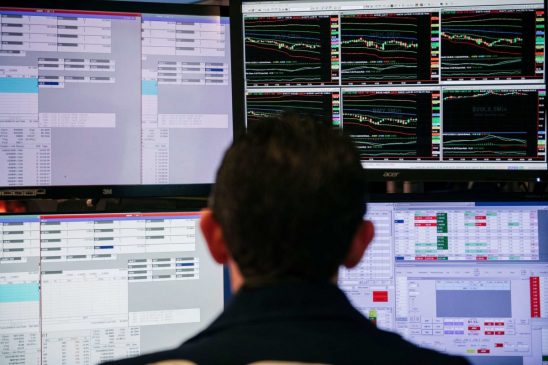- While the Dow Jones dropped 3,000 points in a week, some stock market analysts are still bullish. They say now’s the time to “Buy the dip!”
- But there’s another old saying on Wall Street. “Never catch a falling knife.” One trader warns buying this dip could get “very, very nasty.”
- Here’s why this is not the dip you want to buy.
Months of stock market euphoria have given way to uncertainty and panic. After an exuberant ride up, the Dow is now back to where it was on Oct 26, 2019. In a high tailed retreat, the benchmark has given up over 3,300 points since its Feb. 12 peak of 29,551.
Bulls Say Buy The Stock Market Dip
Still, there are stock market bulls encouraging traders and investors to buy the dip. In a CNBC interview Tuesday, top White House economist Larry Kudlow said:
To me, if you are an investor out there and you have a long-term point of view I would suggest very seriously taking a look at the market, the stock market, that is a lot cheaper than it was a week or two ago.
While Donald Trump’s election chances figure into Kudlow’s calculus, some investors with money riding on it are still bullish too. JP Morgan’s year-end S&P 500 target of 3,400 projects the broad equities index to rise 10% above Thursday’s level.
The bank’s chief US equity strategist says:
We argue investors should not discount the benefit of announced and unannounced global policy responses that are likely to outlast the impact of COVID-19.
Markets are increasingly certain of a federal funds rate cut in March. The CME FedWatch tool indicates the Fed funds futures market forecasts a 70% chance the Federal Reserve will reduce interest rates at the March policy meeting.
So who’s right? The bulls or the– let’s call them realists this week.
Bears Say Never Catch A Falling Knife
The term falling knife suggests that buying into a market with a lot of downward momentum can be extremely dangerous. –Investopedia
On Feb. 3, several days ahead of the stock market’s spectacular rout, Allianz adviser Mohamed El-Erian warned not to bet against coronavirus:
The coronavirus is different. It is big. It’s going to paralyze China. It’s going to cascade throughout the global economy. And importantly, it cannot be countered by central bank policies. So I think we should… try and resist our inclination to buy the dip.
Fast forward to this week’s devastating stock market swoon, and BK Asset Management’s Boris Schlossberg says:
We have been conditioned as investors for the last 10 years to buy the dip continuously. If this is the year that breaks that behavior, that’s going to be very, very nasty for most investors… It’s going to really create a very sour sentiment and you’re going to have much steeper declines than people believe.
Further, Citigroup’s global macro strategist Jeremy Hale isn’t counting on a Fed rate cut. He says recent Fed talk “hasn’t been particularly dovish.” That’s why he says Citi is “reluctant to buy the dip” until there are “signs of a policy response.”
Stock Market Is Primed to Crash Further
There could be more pain ahead for the stock market between now and the Fed’s March policy meeting. In fact, the market’s movements over the past week checked off all four boxes that triggered the 1987 “Black Monday” panic sell off.
That was the stock market’s worst one-day loss in history.
Here is what happened just before the crash:
1. The market makes huge gains beforehand…
2. Market euphoria reigns…
3. Sharp downturns precede the crash…
4. Financial innovation backfires…
In January you could check off 1, 2, and the preconditions for 4. Now the stock market has seen a sharp downturn of over 10% since its Feb. 12 peak.
In recounting Black Monday, UC Berkeley finance professor Mark Rubinstein notes:
The market had been sliding since late August, but it fell a total of 10% the three days before the [Black Monday] crash.
He continues:
When those declines happened, there were a lot of people who started to think about it over the weekend who concluded, ‘This is not the kind of market I want to be in.’
That Monday the Dow crashed 22% and the S&P 500 lost 20% of its market value. If history repeats itself, the stock market could do a lot worse than recent days very soon.
Disclaimer: This article represents the author’s opinion and should not be considered investment or trading advice from CCN.com.
This article was edited by Sam Bourgi.




